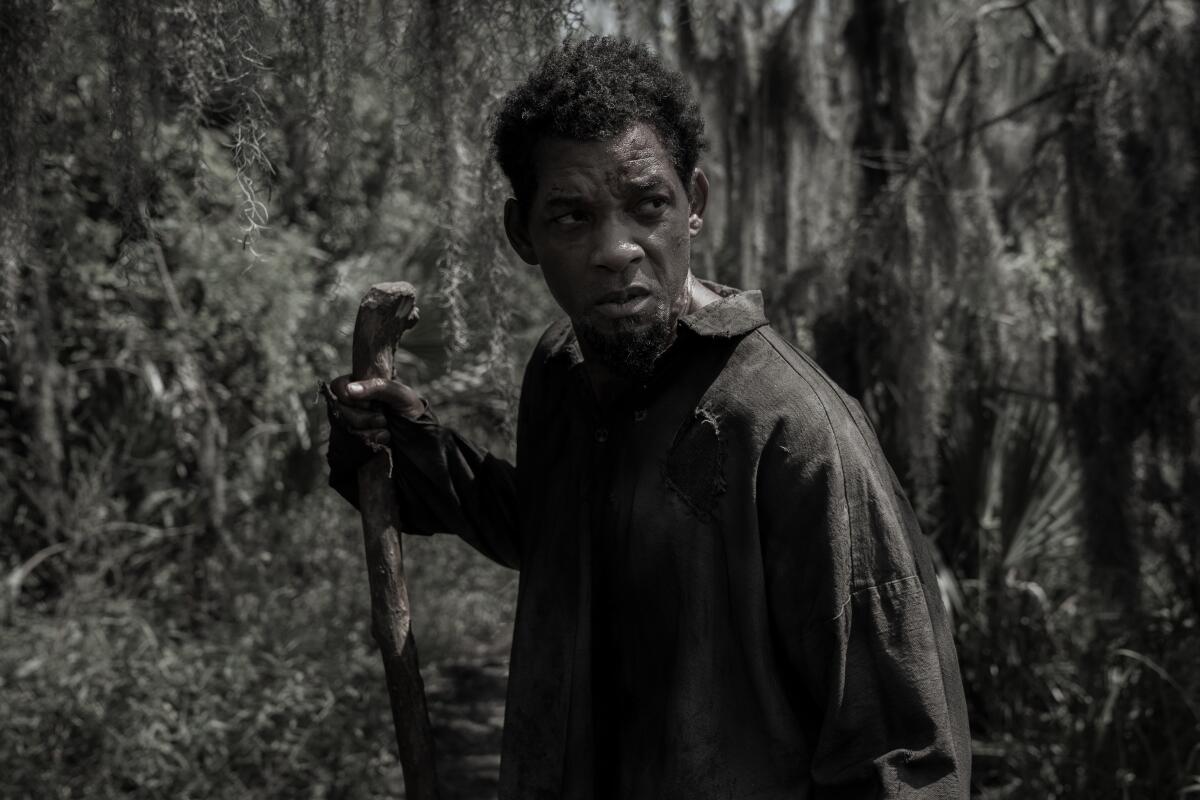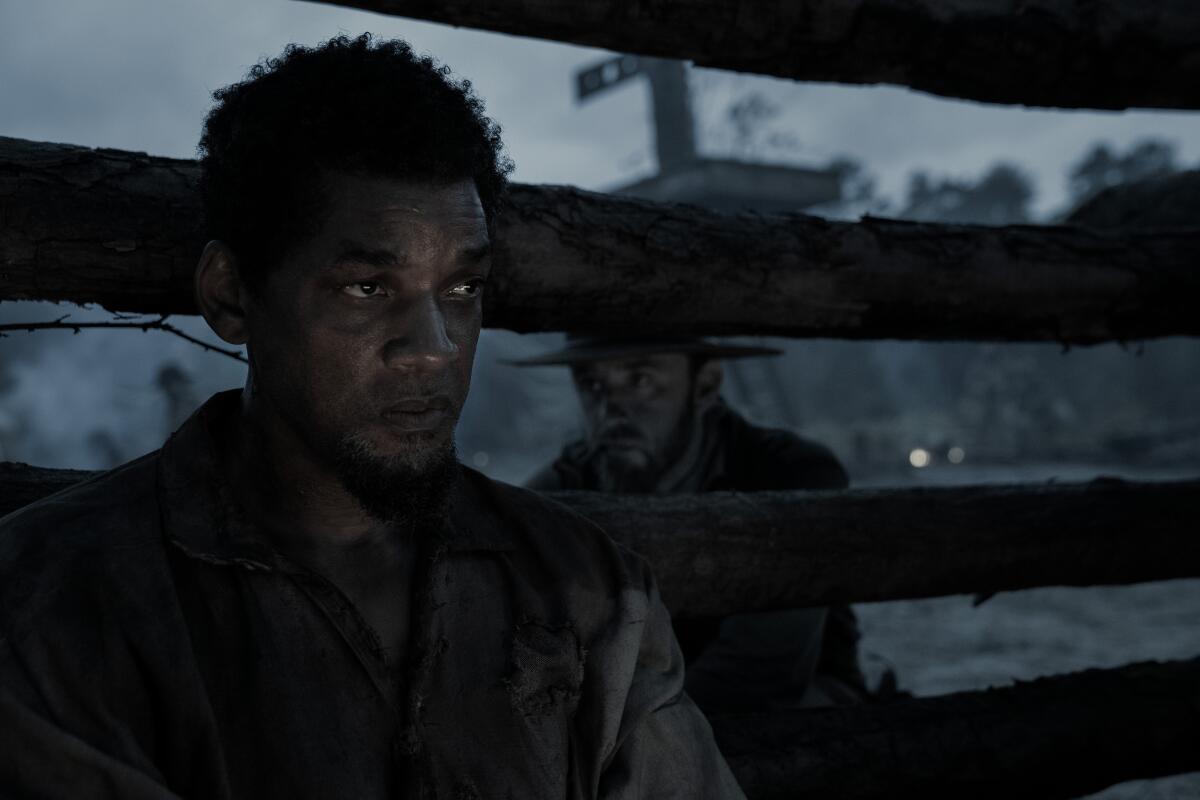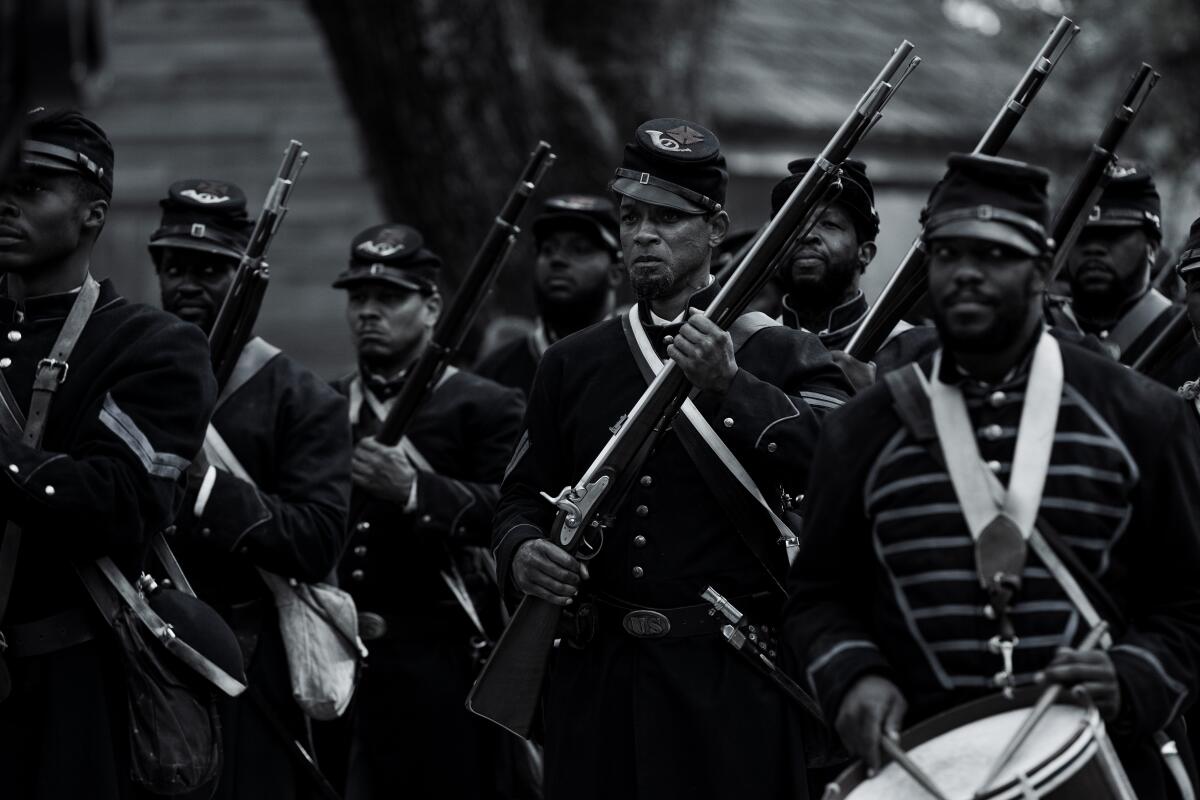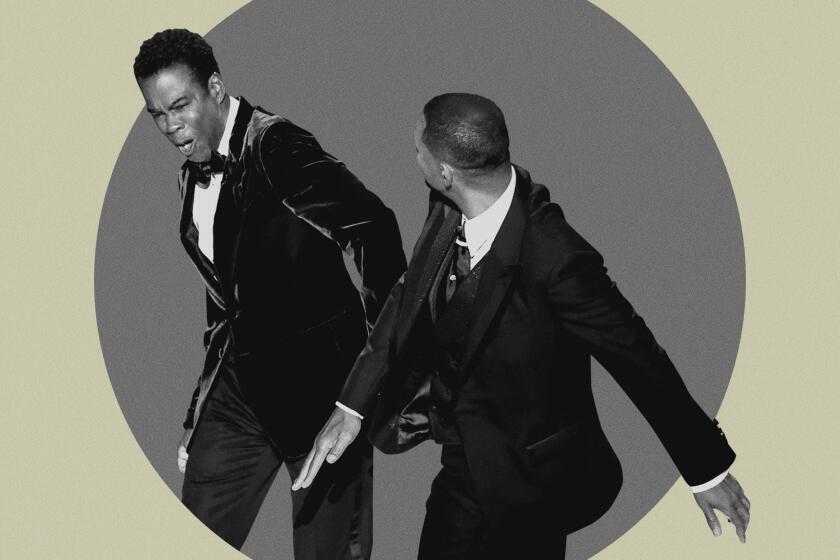‘Emancipation,’ with Will Smith, struggles to do its real-life survival story justice

- Share via
In March 1863, two months after President Lincoln issued the Emancipation Proclamation, a Black man known as Peter (other accounts name him as Gordon) escaped a Louisiana plantation, endured 10 days in alligator-infested marshes and found his way to Baton Rouge, where he received medical attention and soon enlisted in the Union Army. His survival alone is an astonishing story, but what immortalized him was a photograph of the raised welts and scars crisscrossing his back, brutal evidence of a lifetime of whippings. The widely circulated image, variably referred to as “Whipped Peter” or “The Scourged Back,” is credited with fueling the abolitionist movement at a crucial Civil War midpoint, igniting the outrage of Northerners who had never seen the horrors of Southern slavery up close.
Director Antoine Fuqua and his star, Will Smith, reenact the shooting of that photograph toward the end of “Emancipation,” their swampy, sloggy action-movie treatment of Peter’s journey. Fuqua doesn’t show us the lashings that produced those scars, leaving them to the imagination of an audience presumably acquainted with, and likely exhausted by, the many grueling depictions of racist violence in movies and TV series. The pointedly titled “Emancipation” means to focus on acts of physical and spiritual defiance, and it dramatizes the apparatus of chattel slavery primarily to show that apparatus being subverted or overthrown. Here, even a cotton gin can be repurposed as an instrument of resistance, albeit resistance of an especially cruel and painful kind.
For your safety
The Times is committed to reviewing theatrical film releases during the COVID-19 pandemic. Because moviegoing carries risks during this time, we remind readers to follow health and safety guidelines as outlined by the CDC and local health officials.
Little is known about the details of Peter’s life, which serves the purposes of William N. Collage’s narrowly focused screenplay just fine. We first see Peter (Smith) kneeling in prayer just before he is separated from his family, thrown into a cage and transported from the plantation to a labor camp, where he and other male prisoners are forced to lay railroad track. The heat is unendurable, the work exhausting and deadly. But despite the scars on his back and the metal collar around his neck, Peter remains more alert and hopeful than the others. He’s overheard whispers that Lincoln has declared all enslaved people free and that Union troops have made it to Baton Rouge, a blessing from a God he fervently believes in.

“Faith without works is dead,” a preacher intones early on, and Peter gives that Scripture its most righteously violent interpretation. Seizing his opportunity along with a shovel, he metes out some well-earned justice and flees into the bayou with three other men — Gordon (Gilbert Owuor), Tomas (Jabbar Lewis) and John (Michael Luwoye) — with whom he quickly parts ways, the better to improve their individual chances of finding their way to Baton Rouge and the Union troops stationed there. But Peter doesn’t just have to outrun his pursuers, who are led by the broodingly sadistic Fassel (Ben Foster) and armed with guns and bloodhounds. Over the course of his long, arduous journey he must also endure hunger and thirst, alligators and mosquitoes, sweltering heat and complicit plantation owners. (“Runner!” a young white girl screams, chillingly, when she spies Peter racing past.)
Tyler Perry, Tiffany Haddish and others spoke to The Times about Black creatives’ evolving attitudes toward Smith and Chris Rock since the Oscars slap.
It’s easy enough to see what drew Smith to the role of a man who became a vivid icon of suffering and resilience. He has a fondness for dramatic physical transformations and tricky accents (this version of Peter is Haitian-born), and here he obscures his handsome features, if not his natural charm, with a clenched underbite and wrinkled, sun-splotched skin. Pain and self-sacrifice come all too easily to Smith’s characters, as evidenced by various tortured psychodramas running the qualitative gamut from “Hancock” to “Seven Pounds.” And I suspect, given the actor’s public declarations of faith, that he felt some affinity for a character who wears his Christianity on his ragged sleeve, prays before consuming a precious meal of honey and at one point turns a cross necklace into a weapon.
Smith gives the solid, easily sympathetic, sometimes rousing performance you’d expect, even if what’s called for here is less a nuanced feat of acting than a forceful display of sweat, blood and endurance. And “Emancipation,” like more than a few cinematic endurance tests, labors hard to elevate a bloody, barbaric spectacle into an inspiring, high-minded one. Peter’s journey is a gantlet of horrors, barely relieved by moments of grace and respite, but Fuqua and his editor, Conrad Buff, try to imply more than they show, cutting around or cutting away from the ghastly images of Peter’s friends being mauled or decapitated. The director seems vaguely torn between his usual flair for bone-crunching violence (“The Equalizer” movies, “Olympus Has Fallen”) and the desire to forge something more artful and historically resonant from Peter’s experience.

That confusion is reflected in Robert Richardson’s stylized black-and-white cinematography, which is inflected with muted washes of color (a bit of greenery here, a flicker of orange flame there). The mostly monochrome palette effectively evokes a distant era; for better or worse, it also makes the violence, including some blood-on-the-leaves imagery, easier to process. It’s not hard to get swept up in Richardson’s muscular camera moves — particularly his sweeping aerial views of the swamp and, later, a smoke-choked battlefield — or to admire the meticulously mud-caked exteriors of Naomi Shohan’s production design. “Emancipation” seeks to capture a panoramic snapshot of a rattled Confederacy nearing its final days, providing what the production notes describe as “an immersive, 360-degree experience.”
The director opens up about the brutal process of depicting an enslaved man on the run — and the controversy that threatens to overshadow his movie.
But in terms of psychology and character, a 360-degree experience is actually the opposite of immersive, and it’s at odds with the fleet, propulsive survival thriller Fuqua seems to be trying to make. The more the movie pulls away from Peter’s perspective, the more it undercuts its own tension. And even with a physically impressive production at his disposal, Fuqua’s filmmaking instincts are clumsy and prone to cliché. Every flourish — a closeup of horses’ hooves pounding the mud, an action scene rendered in partial slow-motion, a sudden gasp as Peter’s wife, Dodienne (Charmaine Bingwa), awakens from a premonitory nightmare — suggests a filmmaker constrained by the visual grammar of the Hollywood action flick. (The musical grammar, too, judging by Marcelo Zarvos’ unsubtly wielded score.)
If “Emancipation” were nothing more (or less) than that action flick — leaner, meaner, less solemn, less monochrome — it would probably be a better, more honest movie. Certainly I’d rather watch Smith’s Peter go a few more rounds with an alligator, as he does in a scene that briefly jolts the movie to life, than listen to another minute of, say, Fassel’s hoary campfire monologue, with its less-than-revelatory peek into the diseased white-supremacist mind. Foster, so often cast as the villain, doesn’t go as showily over-the-top as he has in the past, but that’s scant consolation. His presence in this role alone is emblematic of the movie’s obviousness.

I suppose it’s no more obvious than Smith’s casting as the persecuted, persevering hero, but that’s par for the Hollywood course. Pricey historical dramas like “Emancipation” — better ones, worse ones — have long depended on stars to leverage their prestige ambitions and sell their weighty subject matter to a largely indifferent public. The viability of Smith’s star persona has of course been cast into doubt since this particular project was set in motion, which is why the much-analyzed events of Oscar night 2022 have generated so much anxiety around their likely impact on the movie’s release, box office potential and (God forbid) Oscar prospects.
What any of that has to do, in the end, with the life of an enslaved man whose courage profoundly shaped the course of racial justice — or the heroism of the Black soldiers who fought for a nation that had done nothing to deserve their loyalty — is well worth wondering. But the answers are pretty dispiriting. “Emancipation” is hardly the first or last picture to be overshadowed by the industry that produced it, or to fall short of the history that inspired it.
‘Emancipation’
Rated: R, for strong racial violence, disturbing images and language
Running time: 2 hours, 12 minutes
Playing: Starts Dec. 2 at Regal L.A. Live and Cinemark Baldwin Hills Crenshaw and XD; starts streaming Dec. 9 on Apple+
More to Read
Only good movies
Get the Indie Focus newsletter, Mark Olsen's weekly guide to the world of cinema.
You may occasionally receive promotional content from the Los Angeles Times.











